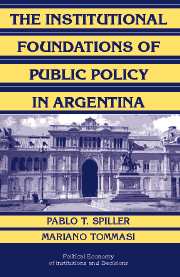Book contents
- Frontmatter
- Contents
- Acknowledgments
- Introduction
- I An Intertemporal Approach to Policy Making
- II The Workings of Political Institutions, Policy Making, and Policies in Argentina
- 3 Congress, Political Careers, and the Provincial Connection
- 4 Federalism, Argentine Style
- 5 The Supreme Court
- 6 The Bureaucracy
- 7 The Nature of Public Policies in Argentina
- Concluding Remarks
- References
- Index
- POLITICAL ECONOMY OF INSTITUTIONS AND DECISIONS
6 - The Bureaucracy
Published online by Cambridge University Press: 17 March 2011
- Frontmatter
- Contents
- Acknowledgments
- Introduction
- I An Intertemporal Approach to Policy Making
- II The Workings of Political Institutions, Policy Making, and Policies in Argentina
- 3 Congress, Political Careers, and the Provincial Connection
- 4 Federalism, Argentine Style
- 5 The Supreme Court
- 6 The Bureaucracy
- 7 The Nature of Public Policies in Argentina
- Concluding Remarks
- References
- Index
- POLITICAL ECONOMY OF INSTITUTIONS AND DECISIONS
Summary
A strong and capable bureaucracy is likely to lead to better public policies. On the one hand, there is the obvious direct effect of the quality of the bureaucracy on the quality of policy implementation. On the other, our analytical framework emphasizes that political agreements leading to effective public policies are more likely to obtain in environments in which it is more feasible to delegate policy implementation to a quality bureaucracy. (The quality of the bureaucracy is an important component of the quality of the environment for political transactions.)
A high-quality bureaucracy does not descend from heaven, but it is itself the product of conscious political decisions over time. The building of a bureaucracy, “civil service policy,” is a policy in itself. In the language of our framework, it is a policy with special investment-like transaction characteristics, and such policies place large demands on the implementation capacity of political systems.
Thus, a poor bureaucracy worsens the policy-making environment, and a poor policy-making environment is unlikely to create a quality bureaucracy. We argue in this chapter that Argentina has suffered from this vicious circle. Political actors do not have a quality bureaucracy onto which to delegate policy implementation, and the weaknesses of the bureaucracy are themselves the result of the poor quality of the overall policy-making environment in Argentina.
In this chapter, we expose some problems of the Argentine bureaucracy, and we argue that those problems are due to the lack of any relevant principal interested in providing long-term incentives to bureaucratic actors.
- Type
- Chapter
- Information
- The Institutional Foundations of Public Policy in ArgentinaA Transactions Cost Approach, pp. 156 - 181Publisher: Cambridge University PressPrint publication year: 2007
- 3
- Cited by

